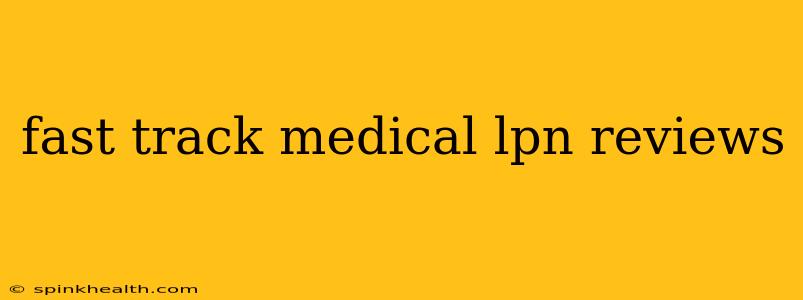The dream of becoming a Licensed Practical Nurse (LPN) often clashes with the reality of lengthy educational programs. That’s where fast-track LPN programs step in, promising a quicker path to a rewarding career. But are these accelerated programs worth it? This isn't just a review of one specific program; it's a deep dive into the pros, cons, and considerations surrounding fast-track LPN training, helping you decide if this accelerated path is the right fit for your life.
Imagine this: You're juggling a family, a full-time job, and the relentless pursuit of a better future. Traditional LPN programs, with their extended schedules, feel overwhelming. Then, you discover fast-track options, promising completion in a fraction of the time. Intriguing, right? But before you enroll, let's explore the key aspects.
What are Fast Track LPN Programs?
Fast-track LPN programs are designed to compress the typical LPN curriculum into a shorter timeframe. This often involves intensive coursework, longer class days, and a more demanding schedule. While the accelerated nature is appealing, it's crucial to understand the implications before jumping in. These programs aren't shortcuts; they demand significant dedication and commitment.
Are Fast Track LPN Programs Harder?
This is a common question, and the answer is nuanced. It's not necessarily "harder" in terms of the material itself. The curriculum generally covers the same core competencies as traditional programs. However, the compressed timeline necessitates a faster pace of learning and requires excellent time management and self-discipline. Expect longer study hours and a less flexible schedule.
What are the Benefits of a Fast Track LPN Program?
- Faster Completion: The most obvious benefit is the significantly reduced time to graduation. This translates to quicker entry into the workforce and a faster return on investment.
- Cost Savings (Potentially): While tuition costs can vary, a shorter program might mean fewer overall expenses compared to a traditional program. However, always verify this by comparing program costs directly.
- Early Career Start: The accelerated timeline allows you to begin your nursing career sooner, earning a salary and gaining experience more quickly.
What are the Disadvantages of a Fast Track LPN Program?
- Intense Pace: The accelerated nature demands significant dedication and self-motivation. Long days and a demanding schedule can lead to burnout if not managed effectively.
- Less Flexibility: These programs often have stricter schedules with less flexibility compared to traditional programs. This can make it challenging to balance work, family, and other commitments.
- Less Hands-on Experience (Potentially): While not always the case, some fast-track programs might offer slightly less hands-on clinical experience due to the compressed timeline. Thoroughly investigate the clinical component of any program you consider.
How Do I Choose the Right Fast Track LPN Program?
Choosing the right program is crucial. Consider these factors:
- Accreditation: Ensure the program is accredited by a recognized accrediting body. This ensures the quality of education and the credibility of your certification.
- NCLEX-PN Pass Rate: Research the program's NCLEX-PN pass rate. A high pass rate indicates a strong track record of preparing students for the licensing exam.
- Clinical Placements: Inquire about the quality and quantity of clinical placements offered. Sufficient hands-on experience is essential for your future success as an LPN.
- Support Systems: Investigate the support systems available to students, including academic advising, tutoring, and career services.
- Cost and Financing: Understand the total cost of the program and explore financing options if needed.
Is a Fast Track LPN Program Worth It?
The answer to this question depends entirely on your individual circumstances. If you need a quicker path to a career in nursing and are prepared for a demanding schedule, a fast-track LPN program could be an excellent option. However, if you require more flexibility or a less intensive learning environment, a traditional program might be a better fit. Weigh the pros and cons carefully and choose the path that aligns best with your personal and professional goals. Thorough research and careful consideration are key to making the right choice for your future.

